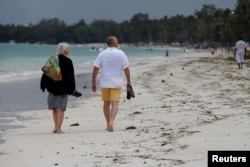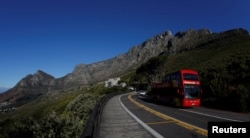African tourism is changing, say travel industry leaders, moving away from the traditional safaris and packaged tours and towards the intimate, indefinable, infinitely Instagrammable lure of “experiences.”
Chris Lehane, head of global policy for Airbnb, said the service has seen huge growth on the continent in the last year, reaching two million bookings this year.
But the new lure, he said, is experiences, which Airbnb offers in several African destinations. In Nairobi, for example, guests can pay $65 to make a short film with a local director. In South Africa’s well-traveled Western Cape region, a traditional tourist magnet, about $100 will buy you a guided bike ride, or a wine tasting, or a jewelry-making lesson.
“I think the underlying story of the data is not only have we had incredible growth over the last year, but what is presages or suggests is going to happen,” he told VOA. “56 percent of travelers are millennials. ... They’re looking for real, authentic experiences. And the fact that you’re having that type of acceleration with millennials suggests and strongly indicates that Africa, and not just South Africa - Kenya, Morocco, Zimbabwe, Botswana Somalia, other parts of the continent - are going to become huge destination markets.”
Lehane acknowledged that not all African destinations are well-developed, in Somalia, for example, Airbnb only has one offering: a nine-bedroom villa in Mogadishu, the seaside capital known for its stunning beaches and for its brutal, bloody street battles between insurgents and the delicate government.
Unique services
But it’s that thirst for the undiscovered, the authentic, that has drawn travelers like Cherae Robinson, who, at age 30, started web-based travel platform Tastemakers Africa. Her site offers a range of experiences, from $3,000 all-in tours, to shorter, a la carte experiences that last a few hours and cost, on average, $77.
“People don’t want cookie cutter,” she told VOA “… When you travel, nobody wants to be crammed into a tour bus. People are looking for authenticity in their lives in general.”
Lehane said he has high hopes.
“I think there are places that I’m not even thinking of right now, in Africa, that are going to explode as markets,” he said. “In the last two years, Mexico City exploded as a tourist destination. After not being one for years, and by the way after not being one because of some of the same questions that people will raise about places in Africa. But it exploded because of the art scene, food scene, history. And you can walk through probably a dozen different cities in Africa that probably would share a similar profile, that could see just taking off.”
Robinson said why not start with her favorite: Accra, Ghana’s vibrant capital.
“We see Accra as the perfect marriage of, sort of, what we think of as sort of traditional West African culture with sort of very modern vibes attached to it,” she said. “And so, from art to entertainment to music to fashion, it all can be found in Accra. In many ways, Accra is the epicenter of those things.”
Bringing profits to locals
Lehane and Robinson said their goal is to build travel that is sustainable and that profits locals, in an attempt to steer clear of so-called “poverty tourism,” which is often seen as not benefiting communities.
Lehane said, Airbnb is investing $1 million to build community-led tourism projects in lower-income neighborhoods, beginning in Cape Town. Tastemakers Africa hosts are all locals, and earn a 15 percent commission for their work.
South Africa-based travel blogger and photographer Heather Mason said while you can’t avoid Africa’s fundamental economic imbalance, travelers can navigate Africa respectfully.
“I don’t really believe in that term. I think every place, in every city, can be a tourist attraction and it shouldn’t matter whether the people living there are rich or poor. But I do think there is something to be said for the way tour operators approach things," she said.
"I think you can definitely get that wrong very easily. If people are on tours through townships or what people might call a slum, and you don’t have local guides, and you don’t brief participants on the tour how to be respectful, then you can run into problems. But other than that, I am an equal opportunity tourist.”
Mason’s heart, she said, is in Johannesburg, South Africa’s gritty, sprawling, diverse economic hub. It’s a city often overlooked because of its reputation for crime and its car-heavy culture. But dig a little deeper, Mason said, and you’ll find a dizzying array of things to see, do, taste, and hear - a microcosm, she says, of the dizzying, colorful, loud, challenging experience that is life in Africa.







